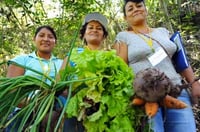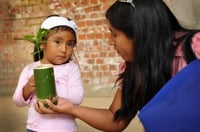 Food Security Solutions Forum Attendees 2012
Food Security Solutions Forum Attendees 2012
Living paycheck to paycheck. Most of us are familiar with this term and for many here in the U.S. managing funds over a two-week period or even a month can be difficult. Now imagine getting paid once a year, and trying to stretch it over 12 months to cover all expenses including food, school, clothes, housing, car and other incidentals.
For most coffee farmers this is a reality of the trade. Money and food are readily available at harvest time, but those resources quickly dwindle, causing families to face months of hunger. In the coffeelands of Central America, seasonal hunger is so common it has a name: Los Meses Flacos, "the thin months". These months occur during the rainy season after the coffee harvest, when farming families have depleted their coffee earnings and corn, beans and other staple food prices are high. During the "thin months" families make ends meet by eating less, eating cheaper foods or borrowing against their future earnings. This seasonal hunger has a debilitating impact on coffee-producing families' health, livelihoods, communities and local economy. The 2011 documentary film After the Harvest highlights the severity of the issue.
 Sustainable Harvest
® 2012 Food Security Solutions Forum
Sustainable Harvest
® 2012 Food Security Solutions Forum
Addressing this issue of food security has been an important part of our work to foster a strong, sustainable supply chain at origin. For three years now, we have conducted an annual hands-on training event called Food Security Solutions in partnership with Green Mountain Coffee Roasters and ACDI/VOCA. Most recently, our annual Food Security Solutions Forum hosted in San Ignacio, Peru Dec. 4-7 drew 85 participants - the majority of whom were women coffee producers. Stable livelihoods among smallholder farmers translates to a reliable supply of high quality specialty coffees for our roaster customers.
To further expand this work we've partnered with Counter Culture, Starbucks, Green Mountain and Farmer Brothers to establish the Coffeelands Food Security Coalition. The first project, in partnership with Mercy Corps and the Nicaraguan organization Asociacion "Aldea Global" Jinotega, will help coffee farming families in the Jinotega Department - the source of 60% of Nicaragua coffee - combat seasonal hunger. The 3-year Empowering Food Secure Communities program will work with 150 women and their families to help them improve farming and business techniques, diversify income through home gardens and additional crop production, and engage more effectively with local government to provide assistance to the hungriest families.
Industry-wide, cross-sector collaboration is critical to addressing the breadth and complexity of the coffee industry's food security problem. We're glad to be working with an impressive group of partners and hope Los Meses Flacos eventually become a distant memory.



.png)
